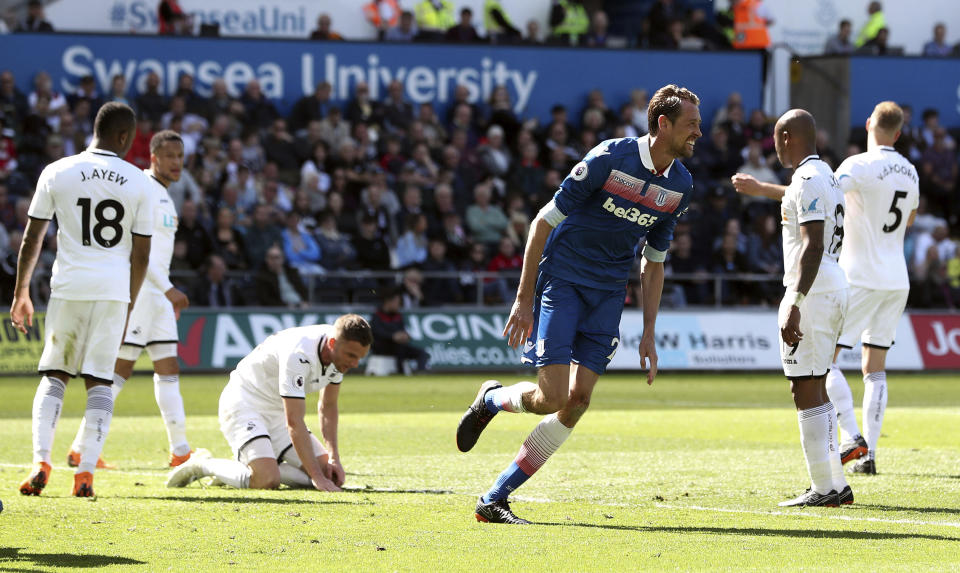Swansea City's relegation highlights the perils of the modern Premier League
Swansea City, for years, was different. It was special. It was distinct. And that’s why, despite a roster that never quite measured up to those of its Premier League rivals, it became a Premier League fixture.
It stayed well clear of relegation battles, finishing between eighth and 12th in each of its first five years in the Premier League. It wowed with attractive soccer, with its steadfast commitment to it, and the conviction with which it played it.
But then it panicked. It wavered. When it did, it began to slip, down the Premier League’s ladder, down a storm drain to the Championship, with nothing to cling onto to save it.
More than two years later, Swansea has been relegated. It said goodbye to the Premier League on Sunday with a 2-1 loss to Championship-bound Stoke. It said goodbye with tears rolling down the faces of stunned, inconsolable players, reciprocated by fans who had grown accustomed to watching top-flight football.

It also highlighted a Premier League truth that is becoming unavoidable: Once you start firefighting, you never really stop. Once a club dedicates its entire existence to avoiding relegation, relegation becomes darn near inevitable. It can be delayed, but not avoided. And Swansea – like Sunderland the year before – learned the hard way.
In Swansea’s case, the truth evolved to something like this: Once you stray from your identity, it is very difficult to recover it. And an identity was what kept the club head, shoulders and torso above water for so long. It was so beautifully defined under Brendan Rodgers and Michael Laudrup, and even under Gary Monk, who had played under his predecessors.
But with his Swans hovering just above the relegation zone in December 2015, Monk was sacked. Swansea, once committed to imposing its style on the league, allowed the clout of the league – and the importance of staying in it – to determine its style.
Monk was the last manager to last more than a year at the club. Francesco Guidolin came and went. Bob Bradley came and went. Paul Clement came and went. Carlos Carvalhal came, and will likely soon go. None of them were able to recapture the unique brilliance of the Roberto Martinez and Brendan Rodgers days. None of them were able to recapture the beauty.
They were able to capture enough points to stay in the league, but not to stabilize. They have ranked in the league’s bottom four in non-penalty Expected Goal differential for four consecutive years now. Even when they did stay up, they looked more like a Championship team. They survived, but after the Monk sacking, they never took steps toward thriving.
In doing so, they highlighted the difficulty of the modern Premier League for every club outside the Big Six. Survival is absolutely imperative. The astronomical revenues available to Premier League clubs, greater than ever before and still growing, makes it so. Thus, those clubs do absolutely anything necessary to stay in the league. They live year to year, even month to month, week to week, rather than planning for the future. The only sustainability that matters is sustaining Premier League participation for one more year.
But the short-term decisions pile up. Each one makes the next more necessary, more desperate and less effective. Players bought by one manager don’t function for the next The club deteriorates. And eventually, it perishes, just like Swansea did Sunday, with a roster incapable of competing in the world’s deepest league any longer.
It perishes not because of the current manager’s failings, though, and not because of a single result. It perishes, rather, because of past decisions that sucked life out of the club – life that previously allowed it to overperform, but in 2017-18, in Swansea’s case, had gone. The squad’s problems were laid bare. And relegation, after two-and-a-half years of turnover and uncertainty, finally arrived.
– – – – – – –
Henry Bushnell covers global soccer for Yahoo Sports. Have a tip? Question? Comment? Email him at henrydbushnell@gmail.com, or follow him on Twitter @HenryBushnell, and on Facebook.


